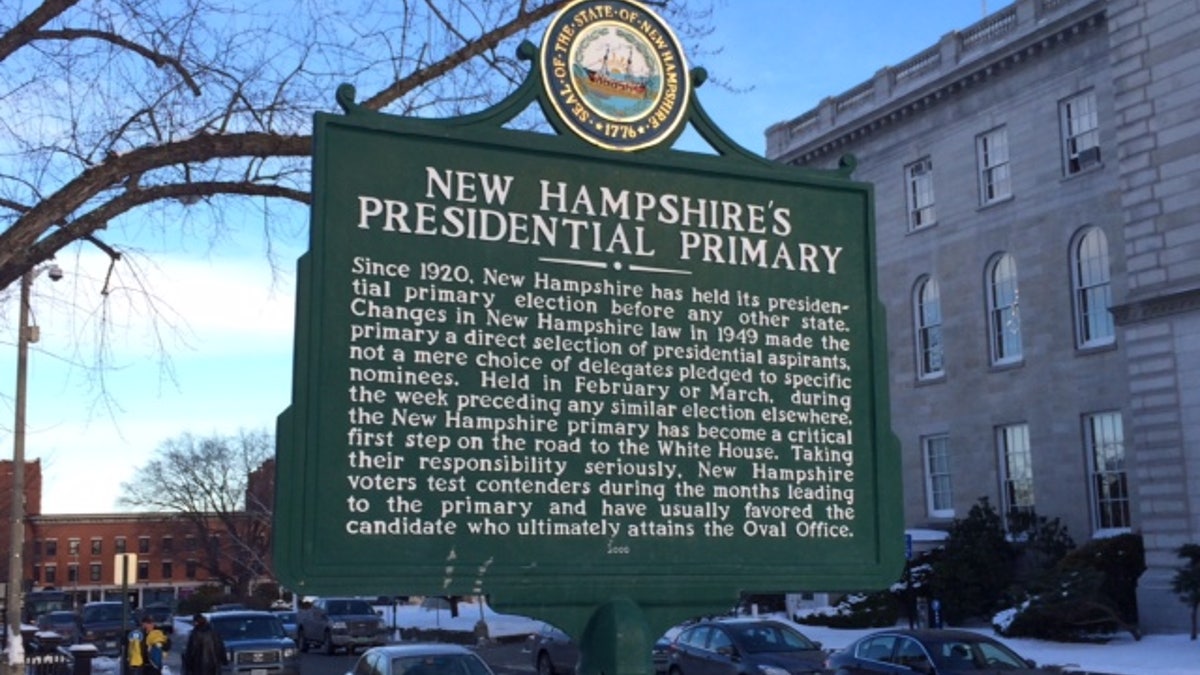Fox News Flash top headlines for February 15
Fox News Flash top headlines are here. Check out what's clicking on Foxnews.com.
A new bill in Nevada would change that state’s presidential caucus to a primary and move the date of the quadrennial contest up to late January, leapfrogging Iowa’s caucuses and New Hampshire’s primary, which have kicked off the presidential nominating calendar for decades.
The legislation - filed Monday by Democrat Jason Frierson, the speaker of the Nevada Assembly - would hold the state’s presidential primary on the second-to-last Tuesday in January and would include 10 days of early voting that would conclude the Friday before the election.
EARLY PRESIDENTIAL PRIMARY STATES' GOP CHAIRS TEAM UP TO PROTECT THEIR 2024 TURF
Nevada is currently the third state to hold a presidential nominating contest in the Democratic calendar, and the fourth state in the Republican calendar, following the South Carolina primary.

Then-Democratic presidential candidate Joe Biden campaigns in Las Vegas, Nevada on Feb. 21, 2020, ahead of the state's Democratic presidential caucuses.
The bill comes after former longtime Sen. Harry Reid of Nevada, who served for eight years as Senate majority leader, made waves in interviews in December and early this month in urging that Nevada leapfrog to the start of the nominating calendar.
Reid, who remains very influential in the national Democratic Party, was instrumental in moving Nevada’s caucuses in 2008 from an afterthought to third position in the Democratic presidential nominating calendar.
"I think we’re entitled to be the first state. Why? Because the power structure of this country is moving west," Reid said in December in an interview in the Los Angeles Times that quickly grabbed the attention of plenty of people in New Hampshire and Iowa.
Reid said that he intends to ask his longtime friend and former Senate colleague – President Joe Biden – to help move Nevada up in the calendar. As president, Biden is the leader of the Democratic Party. Reid added that he’s already discussed his ideas with those close to Biden and with the Democratic National Committee, which will likely make a final decision on the 2024 nominating calendar in the summer of 2022.
The knock against Iowa and New Hampshire for years has been that the states are too White, lack any major urban areas, and aren’t representative of a Democratic Party that’s become increasingly diverse over the past several decades. Nevada and South Carolina are much more diverse and have larger metropolitan areas than either Iowa or New Hampshire.
CLICK HERE FOR THE LATEST POLITICAL REPORTING FROM FOX NEWS
Nevada State Democratic Party Chair William McCurdy II, praising the new bill, emphasized on Monday that "this legislation is yet another reason the Silver State deserves to be the first presidential nominating state in 2024. We are a majority-minority state with a strong union population.
Iowa, which has kicked off the nominating calendar for nearly a half-century, is dealing with the aftermath of the meltdown in the reporting of the results 2020 Democratic caucuses. The debacle in early February of last year became a national and international story. It also raised concerns that the Iowa caucuses could lose their spot leading the calendar.
There’s also been an anti-caucus sentiment by many in the party following the Iowa controversy.
Then-DNC chair Tom Perez said in August that the party should phase out all remaining caucuses. "I think by 2024, we ought to have everyone being a primary state," he told the AP.

New Hampshire has held the first-in-the-nation presidential primary for a century. A sign outside the state capitol in Concord, NH marks the state's treasured primary status.
While a longtime state law mandates that New Hampshire’s century-old primary be held a week ahead of any similar election, the national political parties have increasingly held the power to dictate the presidential nominating calendars.
NEWLY ELECTED DEMOCRATIC PARTY CHIAR VOWS 50 STATE STRATEGY
Longtime New Hampshire Democratic Party chair Ray Buckley is getting ready for the fight ahead.
"New Hampshire takes seriously every suggestion that we should not retain our first-in-the-nation status, and we believe that we have a strong argument for the Granite State to retain its place," Buckley said in a statement to Fox News.
"The level of engagement involved in the electorate here is significantly different than anywhere else, and I think that is one of the arguments why New Hampshire should remain first. We will continue to work hard to ensure New Hampshire retains its first-in-the-nation status, and we’re confident we will succeed," Buckley stressed.
Buckley said that he was informed earlier in the day by his Nevada counterpart of the move by the Silver State.
Newly elected DNC chair Jaimie Harrison of South Carolina has yet to weigh in on the nominating calendar.
DNC spokesman David Bergstein told Fox News earlier this month that "every four years, the DNC looks back at what worked and what didn’t work, and the DNC's Rules and Bylaws Committee will continue to evaluate all areas of our nominating process and make recommendations for any changes."
The review of the 2020 nominating calendar by the Rules and Bylaws Committee should be completed by early spring.
The final decision may also be influenced by Biden. During the Democratic primaries, Biden came in a disappointing fourth in Iowa and fifth in New Hampshire before rebounding with a second-place finish in Nevada’s caucuses.
Right now there’s little talk among Republicans of making changes to the top of their presidential nominating calendar. But changes in one of the party’s primary calendar impacts the other party.
"Usually both parties work in concert because having different primaries for different parties on different days is a logistical challenge for states. The advantage of that is that it usually makes both parties work together on this issue," former longtime Republican National committee member New Hampshire Steve Duprey said recently.
But Duprey, who spent a couple of decades making sure New Hampshire kept it’s first-in-the-nation primary position in the GOP nominating calendar, noted that "this may be the cycle where it can’t happen."
Republican Gov. Chris Sununu of New Hampshire highlighted that "after the uncertainty and turmoil surrounding the Iowa Caucus, New Hampshire’s successful, 100% accurate and timely primary re-instilled voter confidence, giving the entire nation peace of mind in the electoral process."
And in a statement to Fox News, the govenor also singled out longtime secretary of state Bill Gardner, who’s spent nearly a half century protecting the Granite State’s first-in-the-nation status.
"Bill Gardner has overseen our elections for decades and I have full confidence that New Hampshire will continue to serve as the gold standard with another First-in-the-Nation primary next election cycle," the governor emphasized.
Fox News’ Lee Ross contributed to this report






